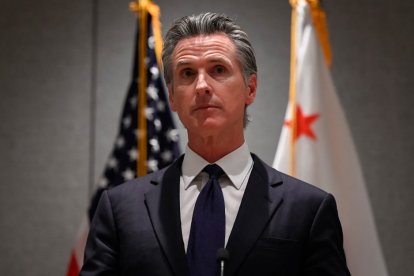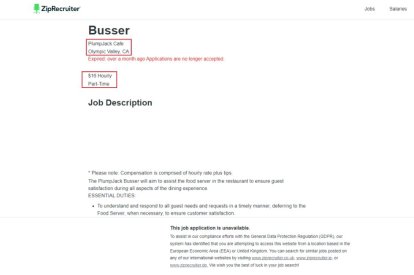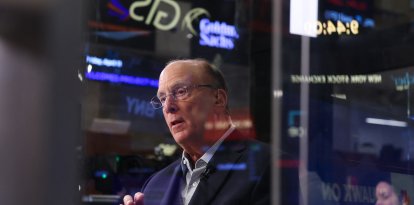Price increases, layoffs and business relocations: The minimum wage law shakes the fast food industry in California
Burger King, McDonald's, Rubio's and Blaze Pizza are some of the restaurants that have taken steps to address the sudden cost increases.

(WANG Zhao / AFP)
Blaze Pizza was born and raised in California. Elise and Rick Wetzel opened the first location near the UC Irvine campus in 2012. Two months later, the second opened in Pasadena. Their headquarters were also located there. More than a decade later, this is about to change.
The "Subway-style pizza outlet," as described in a local newspaper the year it was launched, became one of the fastest growing fast food chains. Last year there were 295 restaurants throughout the country, according to Technomic, 93 of them in their home state. Among its investors, and spokespersons, LeBron James helped market the pizzeria.
This month, company CEO Beto Guajardo announced that Blaze Pizza's headquarters will move to Atlanta, Georgia. The move "will help us drive our next wave of growth," Guajardo explained in a statement reported by Restaurant Business.
By September they hope to have moved their business development, marketing, finance and human resources operations, among other departments. CMO Christian Kuhn told Restaurant Business Online that Georgia, where they only have five locations, is more affordable to live in and that talent abounds in the food industry.
He stated, however, that they will not abandon the Golden State and that despite the poor results last year at the national level "we’re not going to close stores."
Neither of them offered any further explanations. LeBron James also did not comment further.
Blaze Pizza is the latest blow to the fast food industry in The Golden State.
In April, a law went into effect that established the minimum wage for employees of fast food chains at $20 an hour, raising it from the average of just over $16 in 2022. This is one of the highest minimum wages in the country.
'In memoriam'
Burger King, McDonald's, El Pollo Loco and Fosters Freeze are some of the "Victims of Newsom's Minimum Wage," according to a full-page ad published by the California Business and Industry Alliance (CABIA) in USA Today.
"Unprecedented wage hikes have unprecedented consequences, especially in California where the odds are already stacked against businesses," foundation president Tom Manzo said in a statement.
Californians "deserve better," said Manzano, who also blamed the governor:
CABIA highlighted in its campaign that between last fall and this past January, fast food restaurants cut about 9,500 jobs. This is a 1.3% decrease compared to September 2023.
Price increases and layoffs
"Fast-food employers have few alternatives to a $20 minimum wage other than cutting their workforces or raising prices, as fast-food profit margins are slim, averaging 5‒8 percent," said Lee Ohanian of the Hoover Institution at Stanford University.
Ohanian also stated that the law was pushed by unions, describing it as the product of an agreement between unionists and legislators, with some "ugly" results:
Manzano also stressed that employers are forced to raise prices: "People aren't going to pay $20 for a Big Mac. It's not going to happen."
Just a few days after the regulation went into effect, a price increase between 25 cents and $4 was reported. At Burger King, for example, the Texas Double Whopper went from $15.09 on March 29 to $16.89 on April 1.
Other consequences were more dramatic. The restaurant chain Rubio's Coastal Grill announced that it was going to close 48 locations in California after the increase in the minimum wage. That accounts for almost a third of its total locations in The Golden State, Nevada and Arizona.
Newsom defends himself
The governor and his spokesmen have defended the measure, arguing that the loss of jobs is not true. Beyond criticism for the effects of the rule, Newsom received criticism when a company he founded, The PlumpJack, posted a job offer for a busser at $16 an hour.
Although the post for the opening at PlumpJack Cafe expired, it is still listed on ZipRecruiter:

ZipRecruiter Capture
ZipRecruiter Capture (Medium Voice)
Ohanian, from the Hoover Institution, clarified that while the Democratic governor longer manages the company, "many still find it tone-deaf that the spirit of the legislation that he is so proud of is not being followed by his family business."
The analyst added that the $16-per-hour offer reflects the real market price. The restaurant, he says, isn’t offering to pay more because it doesn’t need to. "The job will be filled in Newsom’s restaurant, and perhaps it has already been filled," he added.
"But there are over 9,500 California jobs that no longer exist because they can’t pay what Newsom’s restaurant is paying. And that is the saddest bit of this ugly new law."
RECOMMENDATION





















